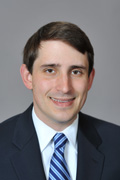 Kyle Robisch, Class of 2014, has won first prize in two student writing competitions.
Kyle Robisch, Class of 2014, has won first prize in two student writing competitions.
Robisch won first prize in the American Bar Association’s Section of Environment, Energy and Resources 2014 Student Writing Competition on Public Land and Policy for his paper, “The NEPA Implied Exemption Doctrine: How a Novel and Creeping Common Law Exemption Threatens to Undermine the National Environmental Policy Act’s Application to Public Lands and Civil Works,” a version which he originally wrote for a research project supervised by Professor J.B. Ruhl, who co-directs Vanderbilt’s Energy, Environment and Land Use Program. Robisch received a cash award of $1,000 and an invitation to attend the Special Institute on Public Land Law, Regulation and Management.
Robisch also received first prize in the California Bar Association’s Criminal Law Student Writing Competition for his paper, “Keeping the Peace and the Constitution: Balancing Community Caregiving Searches and the Fourth Amendment.” He received a cash award of $1,500, and his paper will be published in the CBA’s California Criminal Law Journal in fall 2014.
In “The NEPA Implied Exemption Doctrine,” Robisch addresses a “largely unnoticed but influential doctrine” resulting from the U.S. Supreme Court’s 1976 decision in the case of Flint Ridge Development Co. v. Scenic Rivers Association of Oklahoma. The Court ruled 8-0 that the Department of Housing and Urban Development was excused from filing an Environmental Impact Statement for a proposed project because the requirements of the National Environmental Policy Act and the federal Disclosure Act were inconsistent. Since this ruling, Robisch notes, lower courts have “forged the novel common-law doctrine of ‘implied exemption,’ which releases federal agencies from National Environmental Policy Act obligations when they undertake ‘non-discretionary’ actions.” His article concludes that “given the chance, the Roberts Court will uphold” the “implied exemption” doctrine. He also examines the doctrine’s impact on agency behavior and suggests “modifications that would realign the incentives of agencies and courts as the doctrine matures and spreads to other statutes.”
In “Keeping the Peace and the Constitution,” Robisch addresses the inconsistent application of the “community caretaker function” to exempt searches from the Fourth Amendment’s warrant requirement since the U.S. Supreme Court’s 1973 decision in Cady V. Dombrowski. That decision permitted the warrantless search of an automobile because it was conducted for the purpose of caretaking and without any reason to think the police would find evidence for a crime. However, Robisch notes, the “community caretaker” exemption has since been applied inconsistently in other circumstances, such as home searches. He proposes a uniform standard that extends the warrant exemption to homes, but only “in objectively exigent circumstances, where caretaking is an independent and sufficient justification for entry,” and he also argues that evidence seized in such searches “should be suppressed if it was not in an officer’s plain view.”
Robisch has accepted a two-year clerkship with Judge George K. Sharp of the U.S. District Court for the Middle District of Florida for 2014-16.